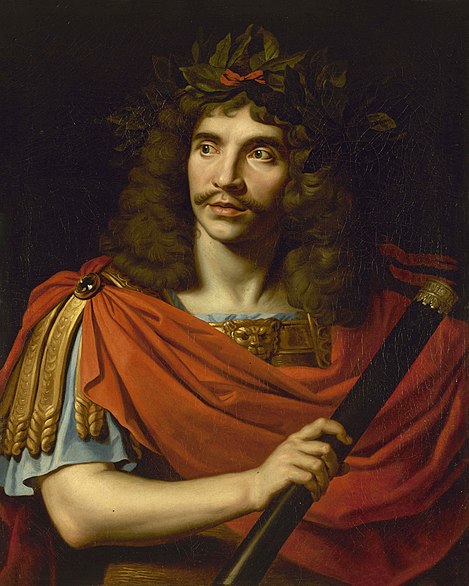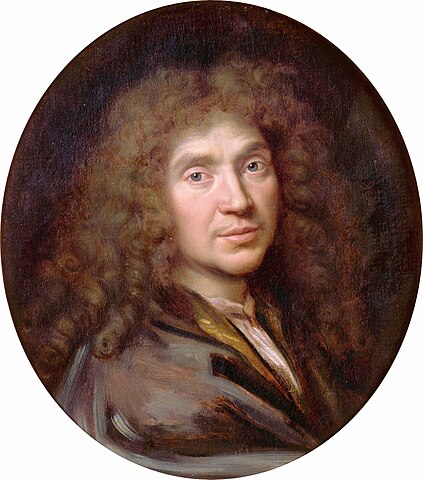 Two new acquisitions by the Thammasat University Libraries allow readers to understand why King Rama VI enjoyed the French playwright Molière’s work so much that he translated it into Thai language.
Two new acquisitions by the Thammasat University Libraries allow readers to understand why King Rama VI enjoyed the French playwright Molière’s work so much that he translated it into Thai language.
Molière (1622-1673), who was born Jean-Baptiste Poquelin in Paris, wrote comedies, including The Misanthrope, Tartuffe, The School for Wives and The Learned Ladies.
These famous plays are now available at the Pridi Banomyong Library, Tha Prachan, to be enjoyed by students and ajarns. King Rama VI adapted Molière’s The Doctor in Spite of Himself, giving the characters Thai names but preserving the humor of the original. These translations into English by the American poet Richard Wilbur make very pleasant reading. Although Molière lived in France in the 1600s, the human weaknesses he pokes fun at are universal. Molière’s characters who follow fashion blindly or pay too much attention to their health are easily recognizable to audiences in Thailand just as they are everywhere else. In 2012 in Bangkok, a Thai translation of Molière’s The Imaginary Invalid directed by Parnrut Kritchanchai of the New Theatre Society at the Democrazy Theatre Studio pleased critics and the public. The title character, convinced he is suffering from a variety of diseases, has his daughter marry a doctor just to have free medical advice readily available in the family. This kind of situation could happen anywhere in the world, even today. Since Molière wrote many of his plays in rhyming verse, this adds to the polish and amusement of the dialogue.
Paying attention to theatre is one way Thai people can experience a wider cultural world than what is available on TV or in the cinemas, mostly products imported from other countries. As Patravadi Mejudhon, founder of Bangkok’s Patravadi Theatre told the New York Times some years ago, in Thailand:
“Children now learn pop songs in kindergarten and the only drama they see is on bad-quality television shows. This is leading to a very real Thai identity crisis. By encouraging contemporary theater we hope people can dig back into their own roots and then keep alive Thai-ness in performances dealing with modern issues…Even if it takes a few years to convince audiences to come through the traffic jams, theater can act as a school to improve television by helping performers and directors find their Thai identity. With no original drama from our own period, how can we possibly understand ourselves?”

Molière is an especially appropriate author for Thailand since in his time, the Kingdom of Siam played an unexpected role in his work. One of the real-life subjects of Molière’s satire, the abbé Michel de Saint-Martin, was the target of a practical joke. Michel de Saint-Martin was very vain and always thought he should receive as many honors as possible. In the late 1600s, the first ambassador to Siam for France’s King Louis XIV returned to his homeland after serving during the reign of King Ramathibodi III of Ayutthaya. Some friends of Michel de Saint-Martin pretended that the former ambassador to Siam brought the news that Ramathibodi Si Sanphet had officially proclaimed him a “high Mandarin,” or member of the nine ranks of high public officials in the Chinese Empire. Michel de Saint-Martin believed this rumor, showing his ignorance by confusing China and Siam. With this type of personality known to Molière, clearly he had lots of subjects available to ridicule.
Molière was especially eager to spoof phonies of all kinds. He wrote Tartuffe in 1664 about frauds who pretend to be religious and virtuous but really are not. In this play, the family of Orgon, a French husband and father, is outraged because he is devoted to Tartuffe, a fake who claims to be very pious. Orgon asks Tartuffe’s advice before doing anything and even wants him to marry one of his daughters, against her will. The rest of the family decides to set a trap for Tartuffe, to show what kind of a person he really is. The goal is to get Tartuffe to admit that he really has a romantic interest in Orgon’s wife. Further complications occur, and it turns out that Tartuffe is a very difficult enemy to trap because of his many skilled strategies for getting money out of people who believe in his fake religiosity. Finally, a policeman arrives with the message that France’s King Louis XIV, known as the Sun King, has issued a warrant for the arrest of Tartuffe, who turns out to be a known criminal. Despite all the drama, the play ends happily, which is the definition of comedy. Yet despite all the jokes and laughs, we can tell that Molière took his characters and their situations very seriously indeed. Just as when King Rama VI translated Molière’s The Doctor in Spite of Himself and made the result into a Thai play, in Richard Wilbur’s English language versions, the stories become of interest to a wider public today.

(all images courtesy of Wikimedia Commons).
